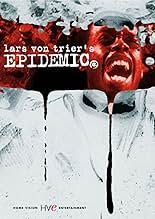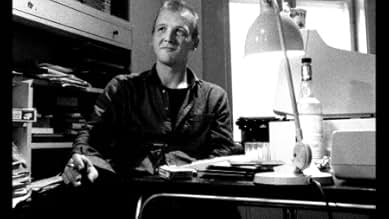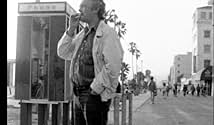Epidemic
NOTE IMDb
5,9/10
6,5 k
MA NOTE
Un réalisateur et scénariste écrit un scénario et, ce faisant, brouille la frontière entre fiction et réalité.Un réalisateur et scénariste écrit un scénario et, ce faisant, brouille la frontière entre fiction et réalité.Un réalisateur et scénariste écrit un scénario et, ce faisant, brouille la frontière entre fiction et réalité.
- Réalisation
- Scénario
- Casting principal
- Récompenses
- 1 nomination au total
Avis à la une
I like Von Trier's films and this one and "The Idiots" seem to me the ones in which he achieves through both the way they are shot and the plot in itself, a high quality of personal artistic expression.
Concentrating on "Epidemic", I think the contrast between the black and white parts and the "story" is intriguing and effective, visually disturbing and helping to create the symbolic meaning the viewer could take from this movie.
To me, beyond more evident interpretations about predestination, Dreyer-like bad and evil explanations, I believe Von Trier -with the help of, for instance, bleak houses, rundown sourroundings and disease- tries to tell us that the world we're living is infected by a growing disease, living its marks in EACH ONE OF US, making Europe in general a dull and heartless place to live, a world killing us very slowly and with it our soul, our sensibility and our ability to feel. Like the final song : "we all fall down".
Against the complacency and cynism of much of the cultural expression nowadays, I think Von Trier's work is an exemple. That is why I recommend "Epidemic" to IMDB users.
Concentrating on "Epidemic", I think the contrast between the black and white parts and the "story" is intriguing and effective, visually disturbing and helping to create the symbolic meaning the viewer could take from this movie.
To me, beyond more evident interpretations about predestination, Dreyer-like bad and evil explanations, I believe Von Trier -with the help of, for instance, bleak houses, rundown sourroundings and disease- tries to tell us that the world we're living is infected by a growing disease, living its marks in EACH ONE OF US, making Europe in general a dull and heartless place to live, a world killing us very slowly and with it our soul, our sensibility and our ability to feel. Like the final song : "we all fall down".
Against the complacency and cynism of much of the cultural expression nowadays, I think Von Trier's work is an exemple. That is why I recommend "Epidemic" to IMDB users.
EPIDEMIC (Lars von Trier - Demark 1987).
Von Trier's second feature reveals his obsessions with cinema, with his self-imposed limitations on film-making in many ways foreshadowing Von Trier's later obstructions upon Jorgen Leth in THE FIVE OBSTRUCTIONS (2003).
Essentially a film about his own obsessions, or a grand parody on horror, as some suggested. Von, Trier, frustrated by the delay of his never realized project, "The Grand Mal", about two gangster families in divided Berlin, made a bet with film consultant Claes Kastholm of the Danish Film Institute, claiming that he could make a feature film for one million Danish kroner. Resulting partly in an amateur movie about a film director and a scriptwriter who must write a new manuscript in five days, interspersed with scenes from the film they are working on - about a young idealistic doctor in the late 20th century, who tries to fight an epidemic, but only manages to spread it further. The film culminates with the outbreak of a deadly plague, not in the past but in the present. Throughout the film, Von Trier shows his fascination with Germany, for example, during a ride through the "Ruhrgebiet", the industrial core of Europe, or the world, at least during the '80s.
Camera Obscura --- 8/10
Von Trier's second feature reveals his obsessions with cinema, with his self-imposed limitations on film-making in many ways foreshadowing Von Trier's later obstructions upon Jorgen Leth in THE FIVE OBSTRUCTIONS (2003).
Essentially a film about his own obsessions, or a grand parody on horror, as some suggested. Von, Trier, frustrated by the delay of his never realized project, "The Grand Mal", about two gangster families in divided Berlin, made a bet with film consultant Claes Kastholm of the Danish Film Institute, claiming that he could make a feature film for one million Danish kroner. Resulting partly in an amateur movie about a film director and a scriptwriter who must write a new manuscript in five days, interspersed with scenes from the film they are working on - about a young idealistic doctor in the late 20th century, who tries to fight an epidemic, but only manages to spread it further. The film culminates with the outbreak of a deadly plague, not in the past but in the present. Throughout the film, Von Trier shows his fascination with Germany, for example, during a ride through the "Ruhrgebiet", the industrial core of Europe, or the world, at least during the '80s.
Camera Obscura --- 8/10
Look, I know a substantial proportion of the American population get a little hot under the collar when funny-talking foreigners start criticising the American government and way of life, but hey - when you're the only country in the world inclined to and capable of dictation of world policy, you gotta take it on the chin. While Von Trier even makes me wince sometimes (the end credits to Dogville for instance), it's his point of view and is worthy of thought. He isn't here to lick your derrière clean for you - if you can't take a little criticism of the homeland, I'd steer clear of any imported movies for a while. Anyhoo, when truly disrespectful films like Titanic break records and reap awards with nary a raised eyebrow, it's double standards to expect non-US films to walk the line you'd like. Von Trier is a genius film-maker... you may not agree with his politics, but you cannot doubt his talent.
The idea of the film is great. Mixing the creation of a movie and his viewing. It's done in a very ambitious way, incredibly sophisticated and elegant when we know the budget who was assigned to the movie.
A lot of scenes are incredible, specially the one who shows the contamination of the priest, adding a reflection on the condition of the black man. Obviously the last scene is one of the most incredible things I've seen on a screen, but we can doubt the mental health of Von Trier and his crew. However maybe it's the reason he's so good...
I didn't like a few things. I think there is too much time about the creation of the movie, a few ridiculous and unappropriated moments as the story of the American letters of Niels
A lot of scenes are incredible, specially the one who shows the contamination of the priest, adding a reflection on the condition of the black man. Obviously the last scene is one of the most incredible things I've seen on a screen, but we can doubt the mental health of Von Trier and his crew. However maybe it's the reason he's so good...
I didn't like a few things. I think there is too much time about the creation of the movie, a few ridiculous and unappropriated moments as the story of the American letters of Niels
"Epidemic" is, at its heart of hearts, a movie about making movies. As such it challenges the relation between fiction and reality. The two are not statically established realms, self contained in their clearly contained functional domains but they are dynamically interacting at all levels and at all times. The result is a movie in which the narrative structure is dual and of a meandering nature, climaxing in what could be a merge between a programmed project that involves human intellectual intervention- the movie within the movie- and the outbreak of a natural phenomenon with its catastrophic consequences- the epidemic.
Styllistically, "Epidemic" is very much a Lars Trier movie and it shows. From the apparently disconnected flow of scenes to mix of gritty realism with allegory, the director imprints his very personal mark in all elements of "Epidemic". Its very structure attests to this and the imagery reflects it in a very overt manner. "Epidemic" seems to be a playing ground of sorts in which Lars von Trier experiments as much as possible and in trying different things creates a diverse mismatch of scenes that not always work completely well together although they create an atmosphere.
As the process of coalescence between "fiction" and "reality" (this reality being, of course, fictional in itself which adds another layer of complexity and challenges the very notion of the third and fourth walls) heightens the narrative frame shrinks from the stage that is Europe to a small room. The claustrophobia of the later phase of the movie bring the full impact of the plague to the viewer's attention via a limited sample of the population that permits a personal experience of it all.
Much like Bergman's "The Seventh Seal", the plague in question is to be read on many levels and very much like the Swedish director's movie, "Epidemic" is not for everyone. Those who find it interesting, however, may have a strangely riveting experience upon watching this clearly unconventional movie that pushes many borders even if does not do so in a completely coherent manner.
Styllistically, "Epidemic" is very much a Lars Trier movie and it shows. From the apparently disconnected flow of scenes to mix of gritty realism with allegory, the director imprints his very personal mark in all elements of "Epidemic". Its very structure attests to this and the imagery reflects it in a very overt manner. "Epidemic" seems to be a playing ground of sorts in which Lars von Trier experiments as much as possible and in trying different things creates a diverse mismatch of scenes that not always work completely well together although they create an atmosphere.
As the process of coalescence between "fiction" and "reality" (this reality being, of course, fictional in itself which adds another layer of complexity and challenges the very notion of the third and fourth walls) heightens the narrative frame shrinks from the stage that is Europe to a small room. The claustrophobia of the later phase of the movie bring the full impact of the plague to the viewer's attention via a limited sample of the population that permits a personal experience of it all.
Much like Bergman's "The Seventh Seal", the plague in question is to be read on many levels and very much like the Swedish director's movie, "Epidemic" is not for everyone. Those who find it interesting, however, may have a strangely riveting experience upon watching this clearly unconventional movie that pushes many borders even if does not do so in a completely coherent manner.
Le saviez-vous
- Crédits fousThe film's title appears in red letters in the upper left corner of the screen for the entire length of the film.
- ConnexionsFeatured in The Making of 'Europa' (1991)
- Bandes originalesTannhäuser (The Overture)
Composed by Richard Wagner
Meilleurs choix
Connectez-vous pour évaluer et suivre la liste de favoris afin de recevoir des recommandations personnalisées
- How long is Epidemic?Alimenté par Alexa
Détails
Box-office
- Montant brut mondial
- 938 $US
- Durée
- 1h 46min(106 min)
- Couleur
- Mixage
- Rapport de forme
- 1.66 : 1
Contribuer à cette page
Suggérer une modification ou ajouter du contenu manquant





















